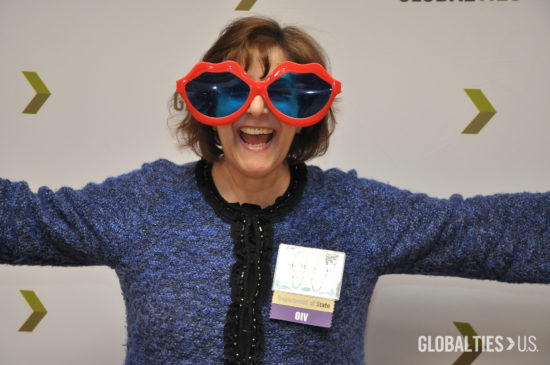By Sana Abed-Kotob, Deputy Director, Office of International Visitors

Sana at the Global Ties U.S. 2020 National Meeting (January 2020). Photo by Quentin Lide
Dear Global Ties Network Family,
As I prepare to retire following more than two decades of working on the International Visitor Leadership Program (IVLP), I’d like to reflect on our collaborative achievements and the evolving landscape of our work.
When I joined the U.S. Department of State in 1999, the world was a different place. That year, we implemented many projects on environmental issues, education, entrepreneurship, media, rule of law, elections, NGO management, women’s empowerment, and law enforcement. While those remain important IVLP themes, emerging security concerns, instability across the world, and terrorism forced us to add a prominent focus on countering threats. “Towards a More Safe and Secure World” and “Women in Peace and Security” became foundational IVLP initiatives. I regret that international threats continue to plague us, but I am proud of the way we’ve channeled our energy and creativity to promote the ideals of peace, justice, understanding, cooperation, and humanity around the world.
I have found satisfaction in partnering with all of you and my colleagues in the Office of International Visitors to achieve our shared goals. I can’t name all the Network friends with whom I’ve worked over the years, so forgive me for citing just a few. As I write this, I see images of Eurica Huggins laughing as we resolved a challenge; Susan Cabiati, Myra Best, and Henry Collins working doggedly to fulfill our many requests; Peggy Parfenoff organizing a lively reception for alumnae of a women’s entrepreneurship project; Sandy Campbell putting a bug in my ear for a photojournalism project that became an amazing special initiative; and Leila Bekri seeking me out at every Global Ties U.S. National Meeting just to catch up on our personal lives.
Our accomplishments are grounded in the strong relationships we have forged throughout our powerful and passionate Network. Through the years, we’ve conquered challenges head on by relying on creativity, strategy, and determination.
Despite the in-person exchange limitations the COVID pandemic created, we proudly initiated and pivoted to several virtual programmatic innovations that support our long-standing goal of having international visitors stay in touch with U.S. counterparts. For example, since early 2020, our Network has reengaged with 800 IVLP alumni through our “Salon Series” projects. Our new “IVLP in the Classroom Initiative” connects IVLP alumni virtually with U.S. classrooms, helping our teachers and students as they endure pandemic-related challenges. Our new “Global Moment in Time” initiative is tackling timely issues of disinformation, peace and justice, and diversity.
This Network has risen to the challenge of remote programming. In 2019, our last complete pre-pandemic year, each IVLP project involved roughly 4.7 Global Ties Network Community-Based Members (CBMs). In 2021, that number rose slightly to 4.9 CBMs per project, proving that not even a pandemic hinders this team’s resolve!
In July 2020, after the deaths of Breonna Taylor and George Floyd demonstrated yet again the plight of Black Americans, I kicked off “diversity chats” with a number of program partners. I learned so much from colleagues like Crystal Kelch, for whom true organizational diversity isn’t just an abstract goal. These chats culminated in Katherine Brown creating the Global Ties Network Diversity, Equity, and Inclusion (DEI) Working Group. The goal – to make room at our table for the many colors, races, religions, ethnicities, and other minorities that grace our nation. Whether you see the United States as a melting pot or vibrant mosaic, I encourage you to keep striving to showcase our diversity. In doing so, you not only elevate our country’s underrepresented communities, but you demonstrate how global exchange participants should aspire to eliminate racism and prejudice in their communities.
For the 22 years I’ve worked with you, you’ve demonstrated passion, professionalism, adaptability, tenacity, and willingness to continually learn and grow. Each and every member of this Network should take pride in your individual role in bridging cultural differences. Whether shaking hands with exchange participants in person, exchanging recipes in a virtual home hospitality, or riding along on a virtual bus, you demonstrate what makes us who we are as Americans.
As I bid you farewell, let me quote Maya Angelou’s 1993 essay, Passports to Understanding: “Perhaps travel cannot prevent bigotry, but by demonstrating that all peoples cry, laugh, eat, worry, and die, it can introduce the idea that if we try and understand each other, we may even become friends.”
Fondly,
Sana Abed-Kotob
